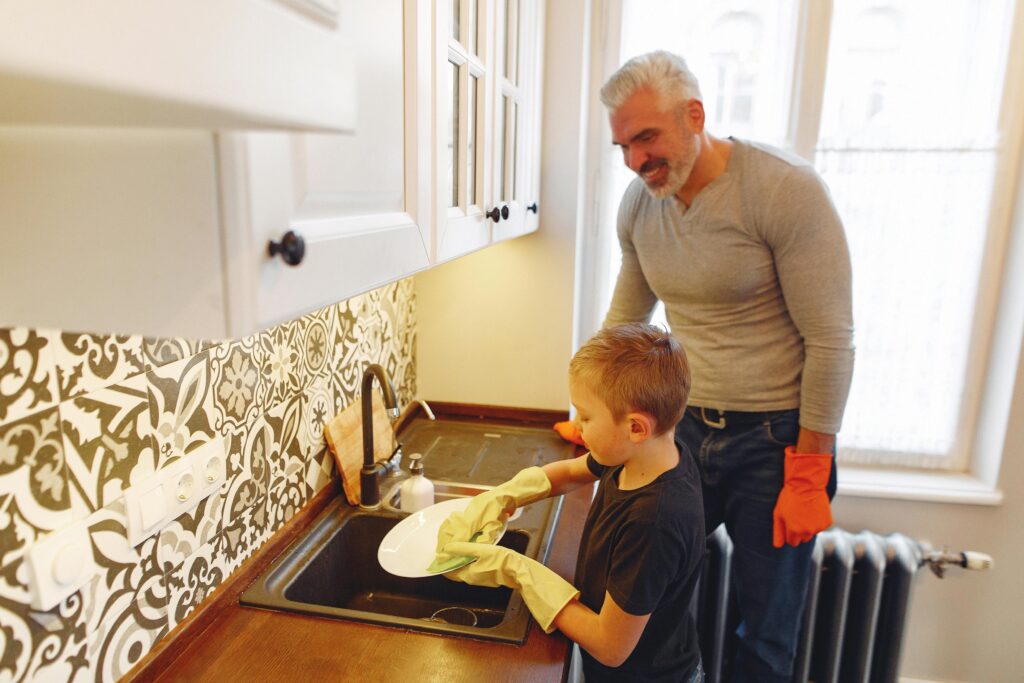I am my children’s perfect teacher.

What is better than raising beautiful women to care for themselves? The answer is: Raising them to know how to care for their homes too!
Proverbs 14:1-5 says a wise woman builds her home.
But, how will they know how to care for the home if they are not taught?
Titus 2:4-5 says the older woman is to teach the younger one of many things, one of them being “working at home”.

Hello! I am Jaquelyn.
My husband and I have 4 children, all 7 years of age and under.
We love the Lord and seek to please him in every way of our lives.
I homeschool my children, am a homemaker, and am a work-from-home mom.
More and more women are struggling to care for their homes (I speaking by experience being one of them)
I wasn’t aware of the importance of knowing homemaking skills as a young teen but I quickly realized just how important it was when I married at 18 years old.
The problem is, children are not being encouraged to learn at home. It could be because mom and dad are too busy, too tired at the end of the day, or simply unaware that it’s important to have children start learning these skills very early in life.
Now, just a disclaimer. We are not going to talk about WHY women tend to clean more than men do or the WHY and WHO should it be done by or other areas regarding this matter. We are here to learn how to get it done simply and most importantly how to teach our daughters (& boys which we talk about in another post) to do it too, to equip them with the tools needed.
A dirty/messy house often means it lacks structure.
I don’t mean if your house one day or a week is messy because you were sick. I mean if your house is permanently dirty/messy there is much lacking in other areas of life. One of those areas lacking is structure and more specifically when you have children, it’s because people are not being taught their role in the home.
For example: You are a mom of 3. A toddler, a youth, and a teen. You all come home from a long day at the park where you had a great picnic. Teenager walks into the home making him or herself comfortable by taking off their shoes in the middle of the doorway, taking off jackets/sweaters and laying them on the nearest flat surface, and rushing into the kitchen for a quick drink leaving their cup behind on the countertop along with their drink source. Meanwhile, the younger sibling runs in the house with muddy shoes, taking out the dog from its crate who will then run onto the sofa all while you carry the toddler into the house.
I have much input about this example we just gave. I have a plan for structure to make the task easier for the parent and beneficial for the children. If you don’t see anything wrong with this, it’s likely your home is run this way and it can create problems down the road. I want you to know it doesn’t have to be this way.
Writing down everyone’s responsibilities within the home is a great start, but not the solution. A consistent structure is the solution.
Have you ever watched Hoarders? So have I !!
It doesn’t mean your house will look like this if you don’t follow a structure. I hope. but what all these people have in common is the lack of a consistent cleaning routine and structure in place. (There are other problems for these people than you may realize but that is another topic for another day).
Ultimately, it is families that benefit from these structures set in place as children.
We want to have rules in place but never forget that there will be days of relaxation for all and some days more laid back than others.
So what are ways we can teach our children these things before it becomes a problem??
- Teach them while they’re Young. (but don’t be discouraged if you start when they’re in their teens)
- Allow them to try a new chore the moment they are Inspired to do so. (For example; if they want to learn how to make quesadillas, teach them to first put the tortilla in the pan and flip it, after you’ve added the drop of oil of course) this keeps them motivated to do the task for next time and to want to learn more)
- Do not force the task if they truly don’t want to do it when you are teaching them HOW to first complete it. (you can enforce it once you are confident in their ability).
- Ask them to help ‘big brother or big sister and maybe mommy or daddy’ so they are encouraged to learn something new. (Offer options on what they’d like to help with.)
- Do not rebuke the mistakes they make while learning a new task. (Accidentally Breaking a dish).

Homemaking is a skill worth fighting for.
In case anyone has ever told you that learning these skills comes naturally.
I AM A WITNESS that they DO NOT, and it is a skill worth fighting to learn, both for us and for our children.
So I encourage you to teach something new or reinforce something within the homemaking world to your children because THIS will help them be better adults and help them play a better role within their families.
